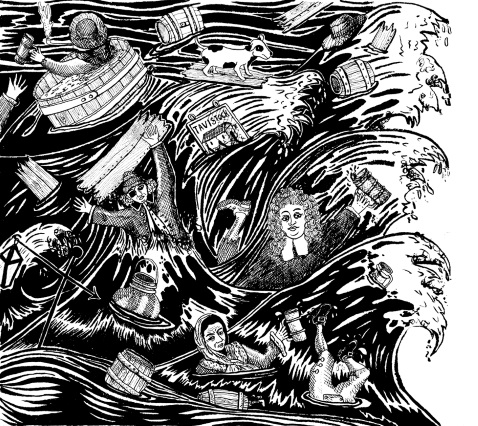Things that make your head spin
Archives
The 1814 London Beer Flood: A Tragic Deluge in St. Giles
SIGN UP FOR OUR NEWSLETTER
The 1814 London Beer Flood: A Tragic Deluge in St. Giles |
A catastrophic brewery accident unleashes a deadly wave of porter |
On October 17, 1814, a catastrophic event unfolded in London's St. Giles district, claiming the lives of eight residents and leaving a lasting imprint on the community.
The disaster originated at the Horse Shoe Brewery, situated at the intersection of Great Russell Street and Tottenham Court Road.
In 1810, the brewery installed a colossal wooden fermentation vat, towering 22 feet high and reinforced with massive iron hoops.
This vat held over 3,500 barrels of brown porter ale, a beverage akin to modern stout.
On the fateful afternoon, one of the iron hoops snapped, and an hour later, the vat ruptured.
The force of the explosion demolished the brewery's back wall, triggering a chain reaction that caused several other vats to burst.
In total, more than 320,000 gallons of beer cascaded into the surrounding streets.
The flood inundated the densely populated St. Giles Rookery, a slum characterized by its impoverished residents and overcrowded tenements.
The torrent reached George Street and New Street within minutes, creating a 15-foot-high wave that engulfed basements and caused structural collapses.
Among the victims were Mary Banfield and her daughter Hannah, who were having tea when the flood struck, and four mourners attending a wake for a two-year-old boy.
Additionally, Eleanor Cooper, a teenage barmaid at the Tavistock Arms pub, was trapped and killed in the rubble.
In total, eight people lost their lives.
In the aftermath, some residents collected the beer using various containers, and there were reports of a ninth victim succumbing to alcohol poisoning days later.
The stench of beer lingered in the area for months.
The brewery faced legal scrutiny but was ultimately deemed not responsible, as the incident was ruled an Act of God.
The financial toll was significant, with losses amounting to approximately £23,000 (around £1.25 million today).
However, the company managed to reclaim excise duties on the lost beer, preventing bankruptcy.
This disaster led to the gradual phasing out of large wooden fermentation vats in favor of lined concrete vessels.
The Horse Shoe Brewery was demolished in 1922, and the Dominion Theatre now stands on part of its former site.
In recent years, the Dominion Theatre has undergone significant developments.
In 2024, the theatre secured its future by purchasing the freehold from its landlord, fulfilling a long-held ambition.
This move ensures that the historic venue, which has hosted productions like "The Judy Garland Show" and "We Will Rock You," continues to be a cornerstone of London's West End.
Additionally, the theatre is preparing to host new productions, including "The Devil Wears Prada," with music by Elton John.
These developments highlight the ongoing evolution of the area, blending its rich history with modern cultural contributions.
As the West End landscape continues to change, with new venues and transport systems opening up fresh parts of the city, the legacy of the 1814 beer flood serves as a poignant reminder of the area's storied past.
Today, visitors to the Dominion Theatre can reflect on this unique chapter in London's history, where tragedy and resilience are interwoven into the fabric of the community. |

